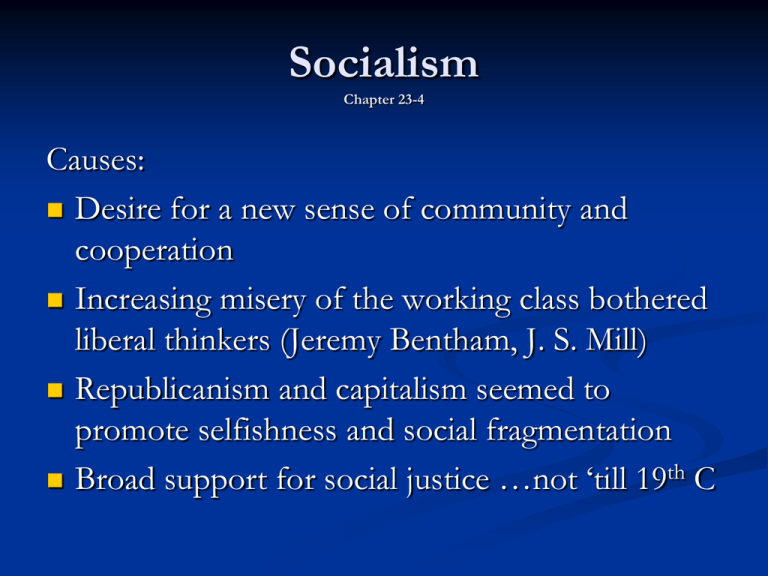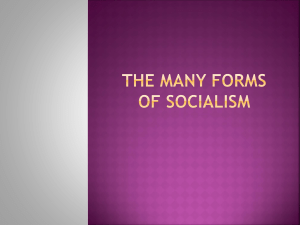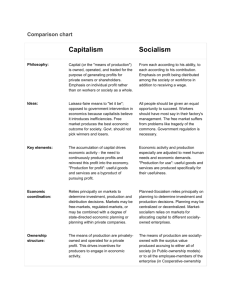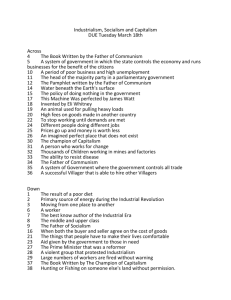Chapter 23 Part 4
advertisement

Socialism Chapter 23-4 Causes: Desire for a new sense of community and cooperation Increasing misery of the working class bothered liberal thinkers (Jeremy Bentham, J. S. Mill) Republicanism and capitalism seemed to promote selfishness and social fragmentation Broad support for social justice …not ‘till 19th C Early French Socialism Early French Socialists proposed greater economic equality planned by the government AKA Utopian Socialism Count Henri de Saint-Simon 1760-1825 Louis Blanc 1811-1882 Pierre Joseph Proudhon 1809-1865 Charles Fourier 1772-1837 Count Henri de Saint-Simon Positivism Industrialism and science = a new age to Europe Will require proper social organization: Parasites (aristocracy, lawyers, clergy) should give way to “Doers” (scientists, industrialists, engineers) Government should provide public works projects and investment banks Every social institution’s main goal should be to improve the condition of the poor Louis Blanc More practical than others Urged workers to fight for universal male suffrage and take control of the state peacefully Government should guarantee full employment: Set up workshops Set up factories Worked with Lamartine and then part of the June Days Revolution in 1848 Pierre Joseph Proudhon Wrote What is Property? Argued that property was profit stolen from the worker who was the source of all wealth Considered an anarchist by many as he distrusted the power of the state Charles Fourier Argued for a planned economy and socialist communities Described socialist utopia in mathematical detail Seven socialist communities were founded upon his ideas (most in U.S.) An early supporter of total emancipation of women Christian Socialism Began in England about 1848 Believed that the evils of industrialism could be ended by following Christian principles Tried to bridge the gap between anti-religious socialism and Christian social justice for workers Scientific Socialism AKA: Marxism Developed by Karl Marx and Friedrich Engels 1830 The Communist Manifesto: the Bible of socialism Intention: to replace utopian hopes and dreams with a brutal, militant blueprint for socialist working class success through the theory of Dialectical Materialism Remember Hegel’s Dialectic? Dialectical Materialism The economic interpretation of history: all human history is determined by economic factors (who controls the means of production and distribution) The class struggle: Since the beginning of time there has been a class struggle between the rich and the poor (the exploiters and the exploited) Dialectical Materialism continued Theory of surplus value: The true value of a product is labor and, since the worker receives only a small portion of his just labor price, the difference is surplus value, “stolen” from the worker by the capitalist. (like Proudham) Socialism is inevitable: Capitalism contains the seeds of its own destruction (overproduction and underemployment) Dialectical Materialism continued Violent Revolution: The increasing gap between proletariat and bourgeoisie will become so great that the working classes will rise up in revolution and overthrow the elite bourgeoisie Above will result in a dictatorship of the proletariat . Working men of the world will unite Dialectical Materialism continued A classless society will emerge as capitalism is dismantled The new order: “From each according to his abilities, to each according to his needs.” Socialism will have a huge impact on 19th century European society.






